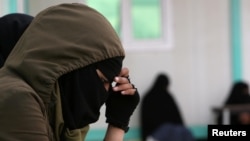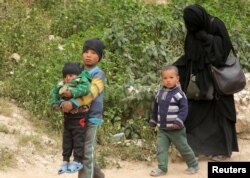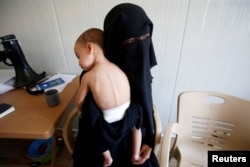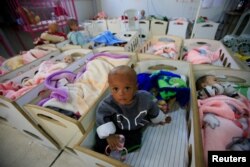The U.N. Office for the Coordination of Humanitarian Affairs (OCHA) is calling on countries to repatriate thousands of wives and children of Islamic State militants in Syria, who are living in dire conditions in the al-Hol camp in al-Hasakeh governorate in northeast Syria.
More than 75,000 people who fled Islamic State's last stronghold in Baghuz are living in overcrowded, desperate conditions in al-Hol Camp.
Women and children comprise 90 percent of the population. Among them are more than 11,000 foreign women and children, including those born of a foreign father or mother.
Governments have expressed reluctance to repatriate their nationals, who left their countries of origin to join the Islamic State militant cause in Syria. But Regional Humanitarian Coordinator for the Syria Crisis Panos Moumtzis said all member states have an obligation under international law to repatriate their own nationals.
He said no one should be rendered stateless.
Moumtzis is appealing to states to accept the children who have the nationality of their foreign mother or father.
He said children should be treated first and foremost as victims. Children have special rights for protection that apply in all situations, he told VOA.
"This has to be irrespective of the children's age, sex, and including any perceived family affiliation," he said. "The perceived family affiliation should really not affect the determination of the best interests of the child.So, it is really a special plea for the children."
The U.N. children's fund estimates there are about 2,500 children living with their mothers in a separate area of the al-Hol camp. Moumtzis said women are being kept apart from the rest of the population to reduce tensions.
He said there is hostility toward them because of their suspected involvement with IS fighters.
He said the area where the foreign women and their children are staying is more restricted than the rest of the camp. The United Nations, he added, has not been allowed to access the area, which is run by the Kurdish-led Syrian Defense Forces.
He said the International Committee of the Red Cross is one of a few organizations allowed to go in and out. The United Nations, he said, provides the ICRC with life-saving supplies, which they distribute to the residents.







